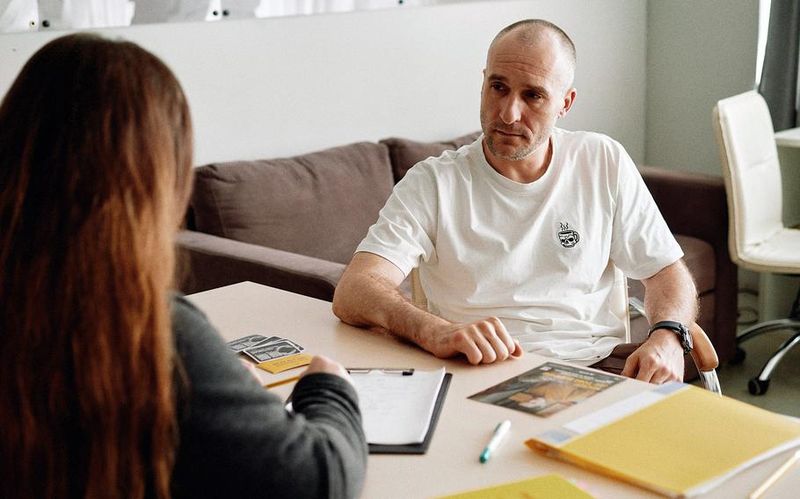18 Subtle Signs You’re Still Healing From A Toxic Relationship

On the surface, you may feel like life is back to normal. Yet, beneath the facade of “I’m fine,” lies a heart still scarred from the past.
Reactions to love, boundaries, and conflict might feel disproportionate or unfamiliar, signifying wounds that haven’t fully healed. Here are 18 subtle signs indicating that your heart might still be on its journey to recovery.
1. You flinch emotionally when someone raises their voice

When voices rise, even in harmless situations, your body tenses instinctively. It’s as if your internal alarm system goes off at the slightest hint of conflict, signaling danger. This reflex is a leftover from times when raised voices were a precursor to emotional upheaval.
You find yourself waiting for the proverbial shoe to drop, expecting criticism or confrontation. This constant vigilance can be exhausting, keeping you on edge even in safe environments.
It takes time to retrain your brain to understand that not all loud voices are threats. Slowly, you’ll learn to breathe through these moments, grounding yourself in the present and recognizing the difference between past and present realities. But until then, the flinch is a sign that healing is still in progress.
2. You apologize for things that aren’t your fault—just in case

Saying “sorry” has become your second nature, a reflexive action performed even when no wrong has been done. It’s a habit formed from constantly walking on eggshells, trying to prevent conflict by preemptively admitting fault.
This over-apologizing stems from a past where blame was often misplaced. Admitting fault, real or imagined, became a survival mechanism to keep peace with a partner who thrived on control.
With time and self-awareness, you can unlearn this pattern. Each moment where you resist unnecessary apologies is a victory, a step toward reclaiming your voice and your confidence. You’re learning that self-worth isn’t measured by how often you say “sorry,” but rather by how you stand in your truth.
3. You brace yourself for kindness

Receiving genuine kindness feels foreign, almost suspicious. Gifts or compliments are met with a cautious heart, as if waiting for the hidden catch. In the past, kindness was often a prelude to manipulation.
Bracing for kindness is about self-protection. It’s a defense against the disappointment that once followed every seemingly kind gesture. Your heart remembers being let down, and it shields itself from future hurt.
Allowing yourself to simply accept a kind gesture can be transformative. It teaches you that not every act of kindness has strings attached. Slowly, you learn to let your guard down, welcoming the warmth and sincerity that others offer, without waiting for the other shoe to drop.
4. You expect people to leave—even when they say they won’t

The fear of abandonment lingers, casting a shadow over even the happiest of relationships. No matter how many assurances you’re given, a part of you always anticipates the end.
This expectation arises from past experiences where promises were broken and departures were sudden. Trust feels like a fragile thread, easily snapped at the slightest tug.
Learning to trust again is challenging but possible. It requires reminding yourself that the past doesn’t dictate the future. Realizing that people who truly care will stay can help you release the grip of fear and embrace the stability of new, healthier relationships.
5. You replay arguments from the past—even in peaceful moments

Even during calm moments, your mind rehashes old arguments, as if they happened yesterday. This mental replay is a symptom of unresolved emotional residue, a sign that your body hasn’t caught up with your newfound sense of safety.
The arguments linger like ghosts, haunting you with feelings of inadequacy or guilt. They intrude upon your peace, making it hard to fully relax and enjoy the present.
By acknowledging these memories and their impact, you can start to release them. Practicing mindfulness can help you stay anchored in the now, gently guiding your thoughts away from the past and into the present.
6. You downplay your needs out of habit

Silence becomes your default setting when it comes to expressing needs. In the past, voicing them was often met with disdain or punishment, so you learned to keep them hidden.
Downplaying your needs was a way to avoid conflict, to keep the peace in a relationship where your desires were considered burdensome. Over time, this habit became deeply ingrained, making it hard to even acknowledge your own needs.
Relearning to articulate what you want and need is essential for healing. Each time you express yourself, you reaffirm your right to be heard. It might feel uncomfortable initially, but it paves the way for authentic and respectful connections.
7. You interpret boundaries as rejection

Boundaries were once tools of control used against you, so now they feel like rejection. When someone sets a limit, it triggers feelings of inadequacy and fear of being pushed away.
Interpretation of boundaries as rejection is a misaligned response from past conditioning. It stems from times when your attempts to set boundaries were dismissed or punished, making you wary of them.
Understanding that boundaries are healthy and necessary can shift your perspective. They aren’t personal attacks, but rather ways to maintain mutual respect and care. Embracing them can enhance your relationships and foster genuine intimacy.
8. You struggle to accept genuine love

Genuine love feels perplexing, almost too good to be true. Where love once came with conditions, now sincerity feels suspect, as if there’s a hidden agenda lurking beneath the surface.
Struggling to accept love stems from a history of manipulation, where affection was used to control or guilt. This makes you question the genuineness of even the purest love.
Opening your heart to real love involves allowing yourself to trust again. It’s a gradual process of recognizing that not everyone seeks to exploit your feelings. With time, you’ll embrace love’s true essence—one that’s nurturing and unconditional.
9. You flinch when someone asks how you feel

The question “How do you feel?” can be startling, triggering a sense of vulnerability. In the past, this inquiry was often a trap, leading to judgment or manipulation.
Your initial reaction is to brace for criticism or to deflect, as honesty about your feelings was once met with negativity. This makes it difficult to openly share your emotions.
Relearning to answer this question with honesty and openness can be liberating. It takes practice to feel safe in expressing your true emotions without fear of repercussion. Gradually, this becomes a path to deeper, more authentic communication.
10. You freeze when conversations get serious

Serious conversations trigger a freeze response, reminiscent of past encounters where vulnerability was exploited. Emotional shutdown becomes a defense mechanism, a way to protect yourself from potential harm.
This freezing stems from experiences where your feelings were weaponized against you, making it difficult to engage openly. It becomes easier to retreat into silence than to risk exposure.
Learning to stay present during serious discussions involves building trust, both in yourself and in others. It requires small steps of courage to voice your thoughts, gradually dismantling the walls that have kept you emotionally insulated.
11. You feel guilty for enjoying your own peace

Moments of peace come with an unexpected companion—guilt. In the past, prioritizing your own calm was considered selfish, as chaos was a constant presence demanding attention.
This guilt arises from a history of self-neglect, where your needs were secondary to someone else’s turmoil. Enjoying tranquility feels like an indulgence rather than a right.
Reclaiming your peace involves recognizing its importance in your healing journey. It’s about understanding that self-care is not only acceptable but necessary. Embracing guilt-free serenity becomes a radical act of self-love and respect.
12. You overthink every text you send

Every text sent feels like a high-stakes game, analyzed and reanalyzed for tone and intention. This overthinking is a remnant of times when communication was a minefield, where words were twisted and used against you.
It leads to hesitation and second-guessing, as you anticipate misunderstanding or conflict. Snippets of past conversations replay in your mind, fueling the fear of saying something wrong.
Breaking free from this cycle involves trusting your instincts and recognizing that genuine connections won’t hinge on a single text. It’s about finding ease in communication, allowing yourself to speak freely without the weight of past shadows.
13. You try to fix others as a way to feel needed

Fixing others became your identity, a method of feeling valuable in a relationship where your worth was tied to usefulness. Helping was a way to stay relevant, masking your own needs by focusing on others.
This behavior stems from a dynamic where your partner relied on you for emotional support, often neglecting your needs. It leaves you with a tendency to shoulder burdens that aren’t yours to carry.
Redirecting this energy toward self-care and personal growth is a crucial step in healing. Recognizing that you deserve relationships based on mutual support, rather than dependency, fosters healthier connections.
14. You still hear their voice when you make decisions

Their voice echoes in your mind, influencing decisions big and small. It’s as if they’re still present, dictating your choices long after they’ve left.
This lingering presence is a testament to the control they once held over your life, where their opinions overshadowed your own judgment. It creates uncertainty and self-doubt, making it hard to trust your instincts.
Silencing this voice involves reclaiming autonomy and confidence in your decision-making. It’s about affirming that your choices are valid, that your wisdom is sound, and that your inner voice deserves to be heard above the remnants of the past.
15. You avoid conflict like it’s danger

Conflict feels synonymous with danger, a trigger for anxiety and unease. In past relationships, disagreements escalated into emotional warfare, making avoidance a survival strategy.
The mere thought of confrontation creates a visceral response, driving you to retreat or acquiesce. It’s easier to sidestep issues than to risk the turmoil that might follow.
Overcoming this aversion requires reprogramming your response to conflict. Recognizing that disagreements can be resolved constructively and without harm is liberating. It empowers you to engage in open dialogue, fostering healthier, more balanced interactions.
16. You feel a weird comfort in walking on eggshells

Walking on eggshells becomes a strange comfort, a familiar dance around anger or disappointment. It’s a behavior ingrained from years of anticipating reactions and maintaining peace at any cost.
This hyper-awareness is a remnant of a relationship where your actions were constantly scrutinized. It makes you overly cautious, even in situations where there’s no real risk.
Breaking away from this pattern involves embracing authenticity, allowing yourself to be seen as you truly are. Learning that it’s okay to make mistakes, to be imperfect, becomes a pathway to genuine, unguarded living.
17. You expect people to read your mind

Expecting others to read your mind is a coping mechanism born from a place where expressing needs led to punishment. It’s a silent plea for understanding, hoping others will anticipate your desires without you having to voice them.
This expectation creates frustration and disappointment when unmet, reinforcing the belief that your needs are too much. It becomes a barrier to open communication and connection.
Learning to articulate your wants and needs fosters clearer, more fulfilling interactions. It’s about trusting that your voice matters and that expressing yourself won’t lead to rejection but to deeper understanding and respect.
18. You’re afraid of being “too much” for anyone new

The fear of being “too much” looms large, a shadow cast by past criticisms that labeled your emotions or actions as overwhelming. It’s a worry that keeps you guarded, hesitant to fully engage with new people.
This anxiety stems from relationships where you were made to feel that your true self was excessive, leading to self-censorship. It makes you question your worth and the space you occupy.
Embracing your whole self, including all your quirks and emotions, is key to overcoming this fear. It’s about believing that you are enough, just as you are, and that the right people will appreciate your authenticity and depth.
